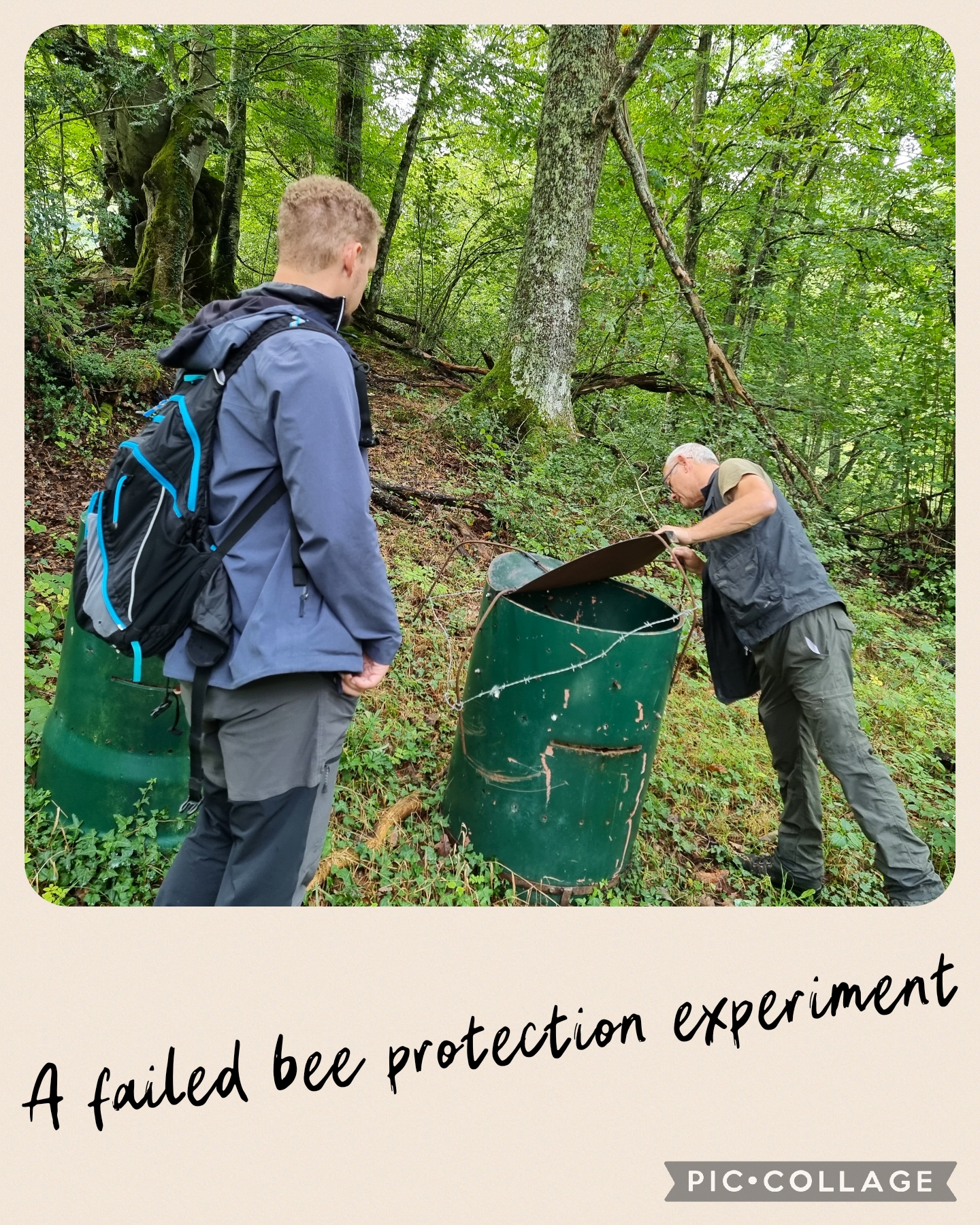
CyberShield donates 800 euros to FAPAS
At the beginning of September 2023, Christian and Adela were in Somiedo National Park in the Cantabrian Mountains in Spain. There they met with Roberto Hartasánchez, President of the NGO FAPAS (Fondo para la Protección de los Animales Salvajes)1. During a private tour, the two were given a very good overview of the site and lots of interesting and sad information.
Since its foundation in 1982, FAPAS’ credo has been: financial independence, practical solutions and social awareness. These parallels to CyberShield warm our hearts.
But why is an organization like FAPAS even needed in the Cantabrian Mountains?
FAPAS: “In general, the wolf is blamed for all the problems facing agriculture and rural and impoverished areas in general. Wolf attacks on livestock in particular are perfect for promoting a negative attitude among the rural population towards anything to do with the preservation of wild fauna and nature conservation.” The bears, eagles and vultures don’t fare much better. Therefore, despite FFH protection status5 from the EU people are still hunting these animals without authorization.
But for an intact ecosystem, we need all animals, including predators. At the same time, we need less human intervention, which is increasingly restricting the habitats of many animals. Humans had completely wiped out some animal species in some areas – such as the wolf, bears and vultures in Germany. FAPAS: “Over the last 35 years in the Cantabrian Mountains, we have managed to save the bear from extinction, wolves have been able to survive in protected areas, nature parks and biosphere reserves and the carrion bird population has no longer been decimated by poisoned bait.”


What exactly does Fapas do to protect animals
- Planting (and protecting) fruit trees for the bears
- Patrols with specially trained dogs to detect poisonous baits
- Reporting poachers
- Educating the population
- Training for livestock farmers
- Scientific monitoring to check the actual stock and its development
- Development of concepts to protect farm animals from attacks (especially bees)

A little digression…
Just because we can do things doesn’t mean that it’s good to do them. In the context of the article, consider, for example, the use of firearms for purposes other than self-defense. Or the laying out of poisoned bait with the intention of killing innocent living beings. In the broader sense one could call slavery, forced missionary work or the exploitation of third world countries into question. The list of things we can do, but perhaps shouldn’t do, is very long. The fact that this is written in the present tense is also intended to indicate that all these terrible things are still happening today. exist! CyberShield believes that humans have a moral responsibility to care for the weak and to work for a better and more peaceful world!
CyberShield does this at various levels:
- We signed the WIN Charter in 2022 out of conviction
- We launched our school project in 2023
- We donate older but still functional IT devices to Labdoo
- We support the Lebenshof Tierlieben with 500,-/month for 1 year
- We promoted culture in rural areas by being the main sponsor of a photo competition for local citizens in 2023
- We have carried out clean-ups
- Our point of view is also reflected in the composition of our team, which we are very proud of: we are a diverse group of people from two continents who are characterized by different religions, cultures and beliefs. We discuss, we laugh, we work together – but above all we respect each other. For CyberShield, this is the normal state of affairs. However, the reality elsewhere paints a different picture: religious wars, economic wars, exploitation or persecution of minorities (both human and animal), etc. CyberShield would therefore like to take this opportunity to emphasize once again how happy we are to have such a committed and peace-loving team! You are the best!
- And here is our latest commitment:
In September, we donated 800 euros to FAPAS for new wildlife cameras


FAPAS already had wildlife cameras. But after they had not only taken in animals and poachers, but also scientific staff who had almost wiped out the entire pack in an attempt to tag wolves (here is the background story: https://vimeo.com/837107925?share=copy ), the wildlife cameras suddenly disappeared… FAPAS would now like to acquire new and better cameras that are no longer detectable.
It goes without saying that we provide support here! The wildlife cameras make an important contribution to the scientific work of FAPAS and to tracking down poachers.
We do a lot to protect bears and wolves, but who protects us from these animals?
A legitimate question. We have compiled some information here:

How do I behave correctly in the event of a wolf encounter?2
- First of all, you should realize how extraordinarily lucky you are right now! Wolves are very shy animals that avoid contact with humans. That’s why it’s a great event when you meet one!
- It is probably still a young and therefore curious animal.
- Calmly and slowly take out your cell phone to take photos of this unique encounter. Enjoy the view!
- If you do feel uncomfortable: make yourself tall and clap your hands/make noises.
- Never feed them or leave leftovers lying around. As a result, wolves lose their fear of humans and that would be your death sentence.
- Since the return of wolves to Germany in 1998, there has not been a single attack on humans. For comparison: in 2022 alone, 6 people were killed and 5 others injured by lightning in Germany alone.3 Incidentally, around 200 people are struck by lightning in Germany every year.6
- So nobody needs to be afraid of the wolf. Nevertheless, these predators should be respected and not harassed.

What should I do if I encounter a bear?4
- Bears are very shy animals that avoid contact with humans. It is therefore very unlikely to encounter one.
- When hiking or mountain biking in bear areas, it is best to stay on the hiking trails and make “normal” noises. A bear bell is also an option. Because most encounters occur because the bear was surprised. It is helpful to enjoy nature with an alert mind and to avoid headphones, for example.
- In the event of an encounter, it is important to behave defensively so that the bear does not feel threatened. Unlike wolves, who would run away, bears sometimes opt for the “attack is the best defense” strategy (even if it is only a mock attack).
- Always remain calm – do not appear anxious or aggressive. Continue walking calmly or move away from the bear. Do not run away under any circumstances. Bears can reach speeds of up to 55 km/h. reach. The average person achieves around 12 km/h (the fastest person in the world achieves 44.72 km/h).
- If the bear does attack, lay on the ground on your stomach.
- Never feed them or leave leftovers lying around. As a result, bears lose their fear of humans and that would be your death sentence.
- In the last 20 years, 8 bear attacks have been recorded in the Alps. The risk is therefore very manageable. Nevertheless, contact should not be provoked.


Yours Adela & Christian

